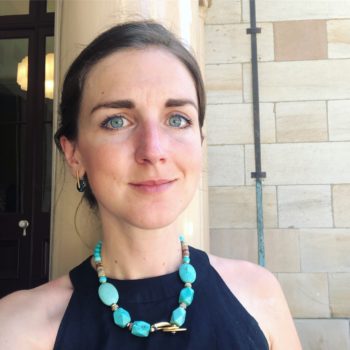International Women’s Day: Dr Roxani Krystalli
An interview with Dr Roxani Krystalli, Lecturer in the School of International Relations, about her experiences and influences as part of International Women’s Day, Tuesday 8 March 2022.
 What was your childhood ambition?
What was your childhood ambition?
I wanted to be a teacher for as long as I can remember. I used to line up my stuffed animals on the stairs, assign them homework, and then proceeded to sit with each of them – the koala, the sheep, the panda bear – and explain what I learned in school that day.
I was born and raised in Thessaloniki, Greece, and have a vivid memory of teaching my stuffed animals the tenses of the English language. A blackboard and chalk was the best present I ever received as a child.
What inspired you to get involved in your area of research?
For over a decade, I have worked as an academic researcher and practitioner in the field of humanitarian action and peacebuilding, interested in feminist approaches to peace and violence.
The questions that animate my work are personal and political at once: What enables people to imagine and rebuild lives after loss? How does storytelling help people make sense of violence and its wake? How can we – scholars, teachers, students, activists – hold the beauty, violence, joy, and injustices of this world in the same embrace?
Is there a particular woman who has positively impacted your career?
I cannot imagine my life as a feminist scholar, teacher, and advocate without Cynthia Enloe.
Many of our students at St Andrews will be familiar with her scholarship on feminism and violence, which has given me analytic tools with which to critically think about the persistence of patriarchy. Her insights on the importance of feminist curiosity and her insistence on asking who and what is (not) taken seriously in a given context are lenses that have shaped my life beyond the prism of career. But it is Enloe’s kindness, her commitment to undoing hierarchies within and beyond the academy, her unflinching support of younger generations of scholars and activists that most gives me hope.
And then there are women I have never met, some of whom are living and some of whom recently died, some of whom are academics and some of whom are poets, who have shaped my life beyond measure. I am thinking here of what Sara Ahmed has taught me about “citation as feminist memory”, about bell hooks’ reimagination of theory as originating from intimate knowledge and pain, about Lucille Clifton and Ada Limón’s poems reminding us that living, practising, and experiencing politics, violence and care can take many forms.
Whose voice would you like to amplify this International Women’s Day?
Like many in our community, I am thinking of Ukraine, so I would like to share this list of Ukrainian literature available in the UK in translation. Like the author Yaa Gyasi, I am skeptical of treating “literature as a kind of medicine to be swallowed” in dark times. I do, however, believe in the power of storytelling and in education as an exercise of expanding empathy, and in that spirit, I plan to read many of the texts on that list.
I should also note that I am writing these words as several universities emerge from a period of strike action to address the effects of systemic inequalities in education. International Women’s Day is most powerful if it does not remain ‘just’ a day on the calendar, if it goes beyond the one-time “webinar on wonderful women”.
In that spirit, I would like to amplify the voices of women and people of all genders facing inequalities in workload, credibility, pay, security and care within the academy. Rather than me telling you who ‘they’ are, I encourage each of us to think about who does the care work in our household, department and community, who gets the credit for it, who enjoys security versus faces precarity, and what power and responsibility we each have to improve the conditions in which we learn, teach, work, live and dream.
Back to International Women’s Day in St Andrews.